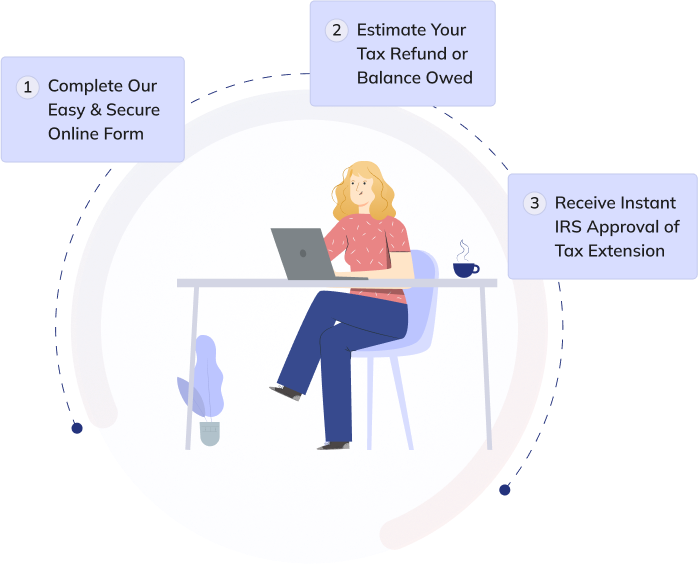File State Tax Extensions
Federal & State Tax Extensions
File State & Federal Extensions Together and Save Time
For Individuals, Families, and All Business Types in All 50 States
Start Your Tax Return
Federal & State Tax Extensions
For Individuals, Families, and All Business Types in All 50 States
Start Your Tax Return
Choose your state from the list below to access detailed instructions for both business and personal tax extensions.
 Alabama
Alabama Alaska
Alaska Arizona
Arizona Arkansas
Arkansas California
California Colorado
Colorado Connecticut
Connecticut Delaware
Delaware District of Columbia
District of Columbia Florida
Florida Georgia
Georgia Hawaii
Hawaii Idaho
Idaho Illinois
Illinois Indiana
Indiana Iowa
Iowa Kansas
Kansas Kentucky
Kentucky Louisiana
Louisiana Maine
Maine Maryland
Maryland Massachusetts
Massachusetts Michigan
Michigan Minnesota
Minnesota Mississippi
Mississippi Missouri
Missouri Montana
Montana Nebraska
Nebraska Nevada
Nevada New Hampshire
New Hampshire New Jersey
New Jersey New Mexico
New Mexico New York
New York North Carolina
North Carolina North Dakota
North Dakota Ohio
Ohio Oklahoma
Oklahoma Oregon
Oregon Pennsylvania
Pennsylvania Puerto Rico
Puerto Rico Rhode Island
Rhode Island South Carolina
South Carolina South Dakota
South Dakota Tennessee
Tennessee Texas
Texas Utah
Utah Virginia
Virginia Washington
Washington West Virginia
West Virginia Wisconsin
Wisconsin Wyoming
Wyoming Alabama
Alabama Alaska
Alaska Arizona
Arizona Arkansas
Arkansas California
California Colorado
Colorado Connecticut
Connecticut Delaware
Delaware District of Columbia
District of Columbia Florida
Florida Georgia
Georgia Hawaii
Hawaii Idaho
Idaho Illinois
Illinois Indiana
Indiana Iowa
Iowa Kansas
Kansas Kentucky
Kentucky Louisiana
Louisiana Maine
Maine Maryland
Maryland Massachusetts
Massachusetts Michigan
Michigan Minnesota
Minnesota Mississippi
Mississippi Missouri
Missouri Montana
Montana Nebraska
Nebraska Nevada
Nevada New Hampshire
New Hampshire New Jersey
New Jersey New Mexico
New Mexico New York
New York North Carolina
North Carolina North Dakota
North Dakota Ohio
Ohio Oklahoma
Oklahoma Oregon
Oregon Pennsylvania
Pennsylvania Puerto Rico
Puerto Rico Rhode Island
Rhode Island South Carolina
South Carolina South Dakota
South Dakota Tennessee
Tennessee Texas
Texas Utah
Utah Vermont
Vermont Virginia
Virginia Washington
Washington West Virginia
West Virginia Wisconsin
Wisconsin Wyoming
WyomingNo, filing a tax extension does not increase your chances of an IRS audit. The IRS grants extensions automatically and does not consider them a red flag. However, accuracy in your tax return remains essential to avoid audit triggers.
The best time to request a tax extension is before the original filing deadline—April 15 for most individual taxpayers. Filing early ensures you avoid last-minute issues and penalties. The IRS generally grants an automatic six-month extension if requested on time.
To file a tax extension quickly and securely, follow these steps:
Complete IRS Form 4868 (for individuals) or Form 7004 (for businesses).
E-file through FileLater.com for the fastest processing and immediate approval, or mail a paper form to the IRS.
Pay any estimated taxes due by the original deadline to avoid interest and penalties.
With e-filing, you receive instant confirmation, ensuring your extension is processed without delay.
To file a tax extension quickly and securely, follow these steps:
Complete IRS Form 4868 (for individuals) or Form 7004 (for businesses).
E-file through FileLater.com for the fastest processing and immediate approval, or mail a paper form to the IRS.
Pay any estimated taxes due by the original deadline to avoid interest and penalties.
E-filing is the fastest and most reliable way to get an extension, with instant confirmation of approval.
Yes, if you owe taxes, you should make an estimated payment when filing for an extension to avoid interest and penalties. A tax extension gives you more time to file, but not more time to pay. FileLater.com allows you to e-file your extension and make a payment to the IRS in one easy step.
To complete IRS Form 4868 for a personal tax extension:
Provide your basic information, including name, address, and Social Security Number.
Estimate your total tax liability for the year and subtract any payments already made.
Enter the amount you’re paying with the extension (if any) to reduce potential penalties and interest.
E-file through FileLater.com for immediate approval, or mail a paper form to the IRS.
E-filing is the fastest and most secure way to get your extension approved instantly.
To complete IRS Form 7004 for a business tax extension:
Enter your business information, including name, address, and Employer Identification Number (EIN)
Select the tax form your business files, such as Form 1120 for corporations or Form 1065 for partnerships.
Estimate your total tax liability and subtract any payments already made.
Indicate the amount you’re paying with the extension (if any) to minimize penalties and interest.
E-file through FileLater.com for the fastest processing and immediate approval, or mail a paper form to the IRS.
E-filing ensures secure, instant confirmation of your extension request.
The deadline to file a personal tax extension is April 15 for most taxpayers. If approved, the extension grants an additional six months to file, moving the final deadline to October 15. E-filing through FileLater.com ensures fast processing and immediate confirmation.
The key rules for personal tax extensions are:
Deadline:You must file Form 4868 by April 15 to receive an automatic six-month extension until October 15.
Payment Requirement: An extension only extends the time to file, not to pay. You should pay any estimated taxes by April 15 to avoid penalties and interest.
Automatic Approval: The IRS automatically grants extensions if Form 4868 is filed on time.
E-filing through FileLater.com is the fastest and easiest way to get instant confirmation of your extension.
Yes, LLCs can file tax extensions using IRS Form 7004 or Form 4868, depending on how the LLC is taxed:
Single-member LLCs (taxed as sole proprietorships) file Form 4868, with the same deadlines as individual taxes (April 15 for filing, October 15 extension)
Multi-member LLCs or LLCs taxed as corporations file Form 7004, with deadlines based on their tax classification (March 15 for partnerships and S corporations, April 15 for C corporations).
E-filing through FileLater.com provides the fastest processing and instant confirmation.
Yes, S-Corporations (S-Corps) can file a tax extension using IRS Form 7004. The key details include:
1.) Deadline: S-Corps must file Form 7004 by March 15 to receive a six-month extension until September 15.
2.) No Tax Payment Required: S-Corps are generally pass-through entities, so the business itself usually does not owe taxes, but any taxes due should still be paid by the deadline.
3.) E-filing through FileLater.com ensures fast processing and immediate confirmation.
If you miss the tax payment deadline, the IRS may apply:
Failure-to-Pay Penalty – 0.5% per month on unpaid taxes, up to 25% of the total owed.
Failure-to-File Penalty – 5% per month on unpaid taxes, up to 25%, if you don’t file on time.
Interest Charges – Interest accrues daily on unpaid taxes, based on the federal short-term rate plus 3%.
Filing a tax extension through FileLater.com helps you avoid the failure-to-file penalty, but you should still pay estimated taxes by the deadline to minimize charges.

Navigating the intricacies of tax filing can often feel overwhelming, especially when deciphering how medical expenses impact your taxable income. With the latest IRS updates for 2025, understanding medical expense …
Read more